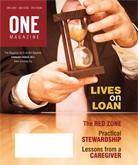
February-
March 2011
Lives on Loan:
The Importance of Christian Stewardship
E-Reader
----------------------
|

The mark of spiritual maturity shows through when a believer takes off his bib and puts on his apron...
Bib or Apron?
by John Gibbs
Stewardship is one of the most used and least understood subjects we discuss in and around church. Before we examine practical applications regarding stewardship, let me explain its meaning. The word stewardship is most commonly used to describe something. We have stewardship banquets, stewardship revivals, stewardship emphasis, stewardship seminars, and more. In most cases, the word is used to indicate that finances, money, and offerings will be involved.
At its best, however, stewardship is used as a verb because action is always involved in stewardship. Stewardship is properly managing what God has entrusted to us, whether time, talents, or treasure. The Greek word for steward is oikonomos, literally manager, overseer, or governor. In light of the above explanation, the word stewardship should be applied to serving.
Recently, the following statement from a popular Christian author impressed me: “The mark of spiritual maturity shows through when a believer takes off his bib and puts on his apron. Immature children wear bibs and expect others to serve them. Those who wear aprons have learned the joy of serving others.” The Bible says it this way, “Moreover it is required in stewards, that a man be found faithful” (1 Corinthians 4:2).
The Bible gives us several examples of faithful servants. For example, Epaphroditus was a great servant of the Lord. In the account of his service in Philippians 2:25-30, Paul said that Epaphroditus served “not regarding his life.” In other words, he served recklessly, exposing his life to danger. He was a faithful servant.
In John 13, Jesus set the standard for serving when He washed the disciples’ feet. In those days it was the job of the servant, a slave, to wash the feet of a guest. These servants became known as “people of the towel,” because they wrapped a towel around their waist and washed the feet of houseguests who had walked the dusty roads and pathways. What an example of serving, when the Lord of Glory stooped to the role of a slave and washed the dirty feet of His disciples. It is evident that Jesus did not come to wear a bib but an apron. He did not come to be served but to serve. What an example He set for us!
At the church where I serve as associate pastor, we adopted a vision statement based on the familiar acrostic—GPS. Officially, these letters stand for Global Positioning System. We revised them to stand for Love God, Love People, and Serve the world. This new directive has provided us with a new incentive for not only serving God but people around us and around the world. It has been refreshing to see God’s people ready to serve instead of being served, ready to take off their bibs and put on their aprons.
About the Writer: John Gibbs is associate pastor of First Free Will Baptist Church in Gastonia, North Carolina. Read more at www.firstchurchgastonia.com. |
|

